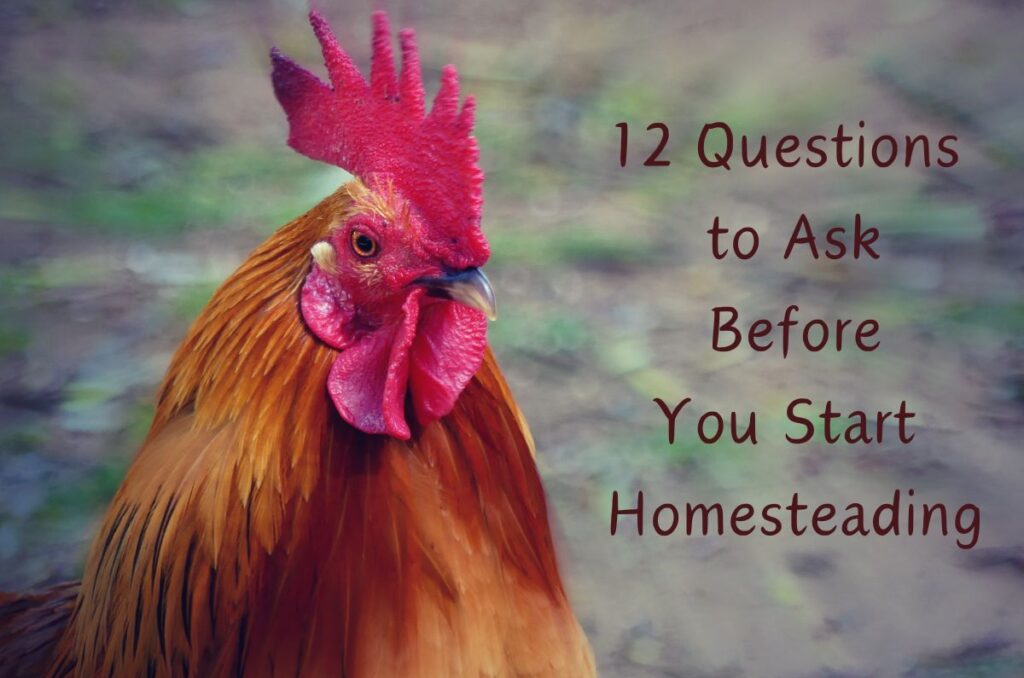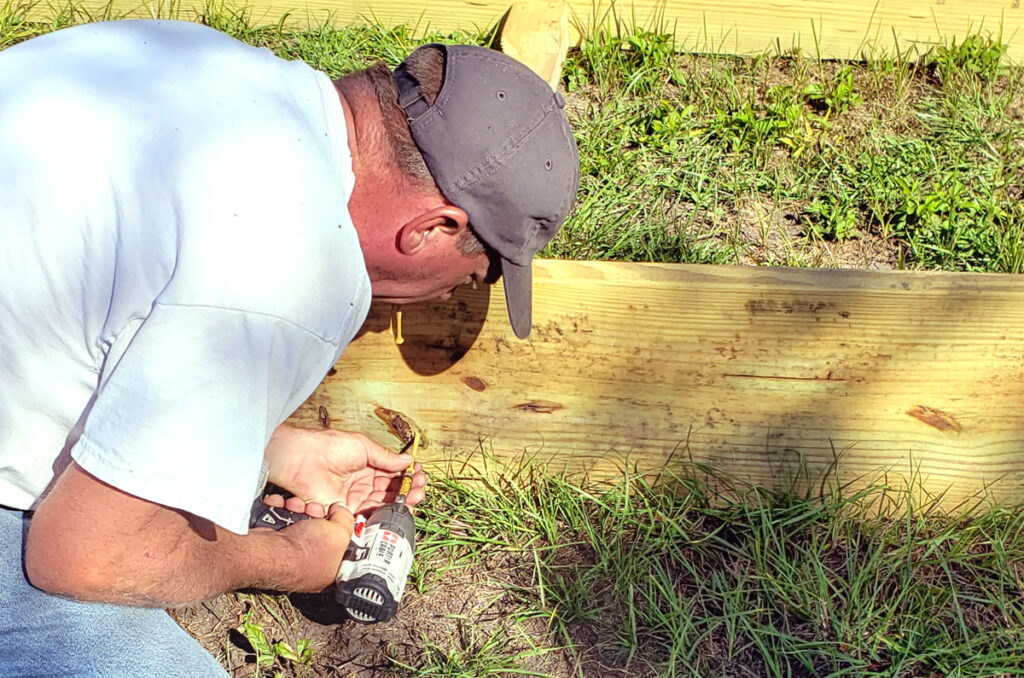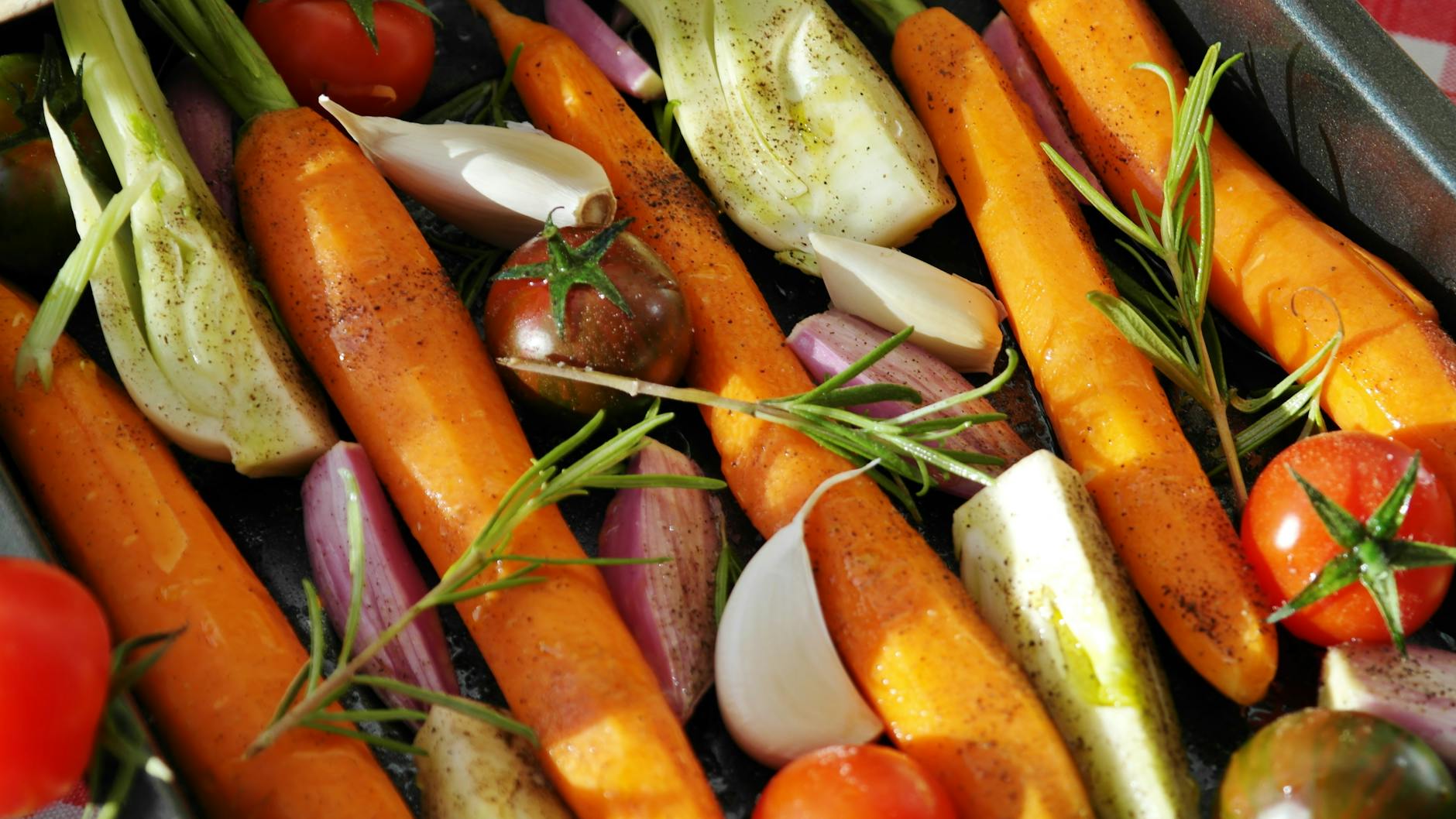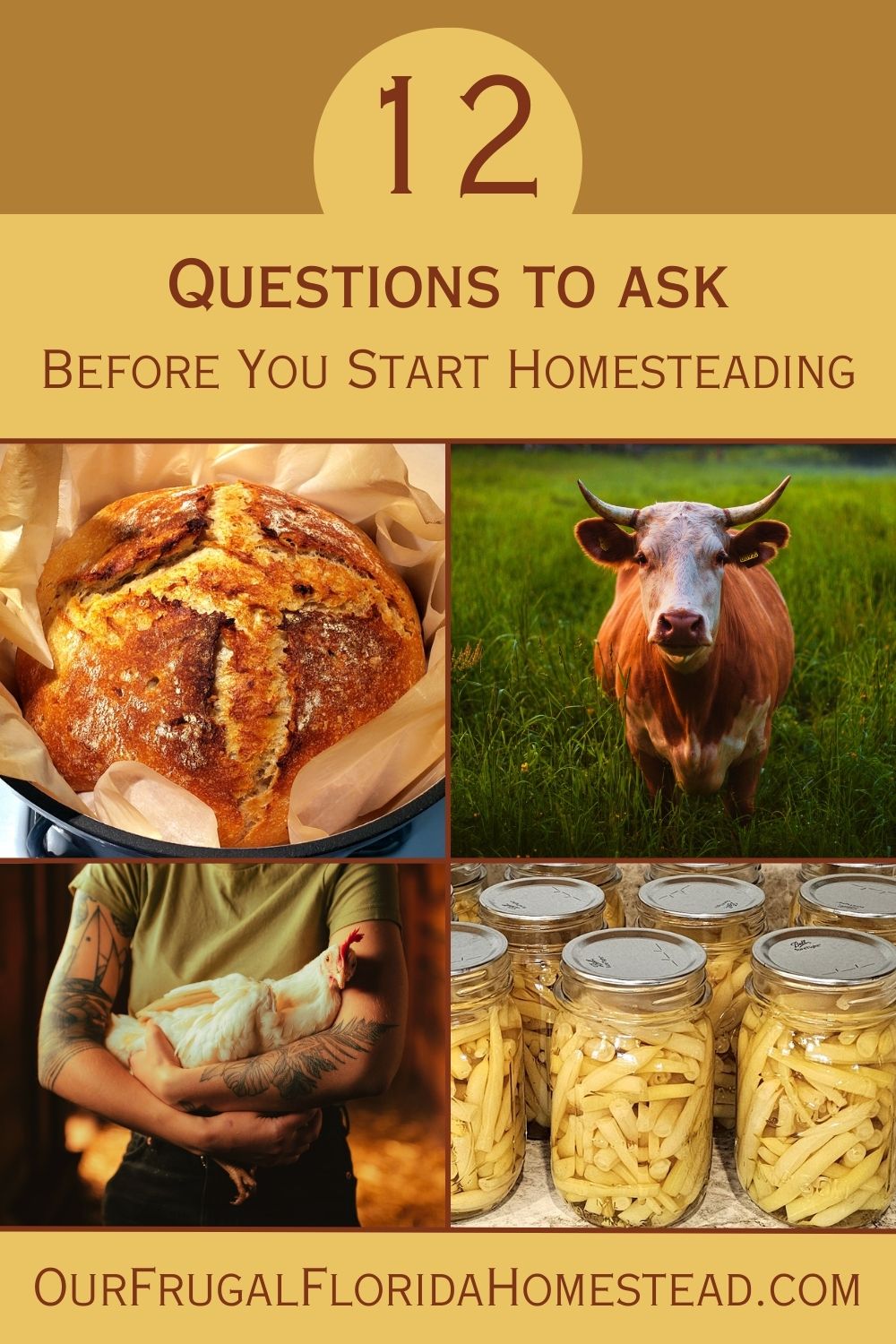If you’re considering homesteading, make sure you ask the right questions before you start so you can create a happy and fulfilling lifestyle.
Although many people thrive on jumping in head-first without any guidelines, having some direction will get your homestead up and running more efficiently. Like any large project, or lifestyle change (for example, building a house or getting married) asking the right questions will lead you down the road to success.

Here are 12 questions for you to ask that will help you make informed decisions to create a homesteading lifestyle that will align with your goals, values, and resources.
Start Your Homesteading Journey with These 12 Questions
- Why Do I Want to Homestead?
- What are My Homesteading Goals?
- What Resources do I Currently Have?
- What are My Interests and Passions?
- What are My Essential Homesteading Skills?
- How Much Time Can I Commit?
- What are My Dietary Preferences?
- What Are My Local Regulations?
- What Are My Environmental Considerations?
- Who Are My Community Resources?
- What is My Budget?
- How Will I Handle Challenges and Setbacks?
1. Why Do I Want to Homestead?
This is the most important question to ask when you begin your journey. You’ll need a good reason to take on homesteading and its multi-faceted practices. The answer to this question will sustain you through difficult times, and bring you great satisfaction when your achievements support your “why.”
When you’re ready to dig deep into your “why,” read the article: Why Do You Want to Homestead to get clarity and direction.
2. What are My Homestead Goals?
“SETTING GOALS IS THE FIRST STEP IN TURNING THE INVISIBLE INTO THE VISIBLE.”
Tony Robbins
What is your vision for your homestead? Creating goals and turning them into achievable tasks will give you a clear road map for your homesteading journey.
What are some ways you wish to introduce self-sufficiency, sustainability, and simple living into your life?
It was the process of setting attainable goals that helped me and my husband move from a homestead in the suburbs to finding and purchasing our rural homestead.
One of my goals for 2024 is to create more goal-setting resources for you. I’ll update this page soon with all the tips and tools you’ll need to create your own homesteading goals.
You can get a jump-start with my 10-page guide: How to Start Homesteading from Scratch:
3. What Resources do I Currently Have?
“Resources: A resource is anything that is used to create value.”
Simplicable.com
Some common types of resources a homesteader relies on include: land, natural resources, energy, finances, transportation, architecture, labor, and knowledge.
For example, do you already own a home where you plan to homestead? Do you have money saved for investing in a homestead property? Is your kitchen currently equipped to create meals from scratch? What gardening equipment and seeds do you already own? Do you have property available to raise livestock?

Create a list of assets and resources. Use the list to start building some of your goals based on what you have already.
4. What are My Interests and Passions?
To create a homestead you love, you’ll want to pursue activities that align with your interests.
What excites you most about homesteading? Go back to your “why” to rediscover your passions.
What do you want to do on your homestead? Review your goal list. Does it align with your interests?
What do the other people in your household wish to pursue as homesteaders? Have a family meeting or create a guessing game for the kids to find out what others wish to do.
5. What are My Essential Homesteading Skills?
Homesteading requires many skills such as home cooking, gardening, animal husbandry, carpentry, preparedness, etc.
What homesteading skills do you already have? What do you need to learn?

Learning and building on your skills is essential to achieving your goals and enjoying the homesteading lifestyle.
These three articles below will help you assess your skills, evaluate which are most important, and give you a path forward to learning and developing them.
- What Are Your Unique Homesteading Skills
- 16 Tips to Upgrade Your Homesteading Skills
- How to Practice Homesteading
6. How Much Time Can I Commit?
Honestly, I put “time” into my resources list. You could purchase as much land as you wish, buy some livestock, and install the most gorgeous raised bed garden, but if you don’t have time to develop or maintain it, then homesteading can get challenging.
Time management is one of those essential skills a homesteader needs. When creating your projects and goals, make sure to include how much time each one will take to achieve. If you’re not sure, ask someone who already does that, or walk through the steps in your mind and make a good guess.
You can always adjust goals. The birth of a new family member, an unexpected bumper crop, a sickness in the family, or unexpected income loss happens to all of us. Resiliency is a key part of homesteading. Every chalkboard has an eraser, every digital device a restart button. Write your goals to include enough time plus maybe a “Plan B” if needed.
7. What are My Dietary Preferences?
One of the most common reasons people choose to homestead is to grow their own food. They give a variety of reasons including: avoiding pesticides, more nutrient-dense foods, protection against supply chain breakdowns, and overall better health.
The simple questions are: What do you eat? What can you grow that you like to eat?
You don’t have to grow “all the things,” simply grow food you like preparing and eating. For example, we like root crops: carrots, beets, potatoes, etc. My husband and I have high-energy metabolisms and this is a delicious way to get our carbohydrates. Plus, those are the foods we grew up with and still enjoy eating.

An easy way to decide what to grow is to track your meals for a few months, preferably for a year. From that list, write down anything that can be grown in your climate. Then gradually add growing each item to your homestead goals.
As an example, if you like to eat salsa every week, try growing most of the ingredients to make fresh or canned salsa. If you can grow corn in your climate, you could grow your own corn to grind into cornmeal and make corn tortilla chips.
Most homesteaders start with the staples of their diet, then move on to more difficult, or time-consuming food growing and processing.
8. What are My Local Regulations?
This question is often overlooked by new homesteaders. Not all rural land is open for raising cattle or other grazers. Many suburban communities will still not allow chickens or let you grow a garden in the front yard.
Check with your local communities to learn the regulations before investing in expanding your homestead or before purchasing property. Ask at your local library for resources, visit your city’s or county’s website, or if in a HOA, attend a meeting.
9. What are My Environmental Considerations?
Find your state and local environmental regulations. Here in Florida, there are times of the year when we’re not allowed to apply fertilizers containing nitrogen or phosphorus due to our unique waterways and wetlands. (Another great reason to compost!) Learn the unique environmental regulations that might affect your homestead.
Your environmental regulations can usually be found on your city or county government agencies websites. Ask at your local Extension Service too.
10. Who are My Community Resources?
No matter how self-reliant we wish to be, no homesteader is an island unto themselves. We find our greatest strength in community. Sharing resources, trading, bartering, teaching, plus community celebrations; they’re all important to creating a fulfilling, and even joyful homestead life.
Who are your resources of family and friends to rely on? What access do you have to teachers for new skills you wish to learn? Where can you go in your community for support?
When the time is right, remember to become the one to “give a hand up” to the new homesteader just behind you on the journey.
11. What is My Budget?
We touched on this earlier in question three regarding financial resources. Having a budget helps you stay on track with your goals, prepare for upcoming expenditures, and evaluate new goals.
Set yourself up with a manageable budget and find a financial advisor if needed.
Living frugally can assist you with staying on budget. Our Frugal 5 Series gives practical ways to live within your means, make good use of your time, and even get out of debt if necessary.
Explore how frugal living can help you on your homestead journey:
12. How will I Handle Challenges and Setbacks?
Mental preparedness is just as important as physical. Learn to set realistic expectations for your homestead. Try not to overschedule your time and over expend your budget.
Start small. Every homesteader I’ve listened to or talked to has said this. Homestead overwhelm is real. Take your time to learn new skills. By starting small you can gain practical experience and insights that will assist you in creating larger plans and goals later on.
Many homesteaders like to journal too. Keep a garden calendar or some sort of record-keeping process so all that information isn’t dancing around in your mind. If you’re visual, create videos, or maybe a YouTube channel just to track your progress.
The homesteading community is huge. There’s plenty of people to turn to for advice, or just listen. Engage with others by joining local groups, online communities and forums, or maybe you’ll find a few neighbors who can provide support and accountability. Sharing your goals with others can also provide guidance, encouragement, and motivation for them.
In Conclusion
By answering these questions you’ll be able to make informed decisions and create a homesteading lifestyle that aligns with your goals, values, and resources.
Remember to start small to gradually build on your successes and learn from any failures.
Take time to reflect on your answers. Discuss with your family, journal, or create videos. Not only will that help you grow as a homesteader, but it’s a lot of fun to look back years later and realize all that you’ve accomplished.
PIN FOR LATER!

[…] choosing to live sustainably, growing a garden, raising livestock, living off-grid, etc. Read 12 Questions to Ask Before You Start Homesteading to learn specific questions that will help you with your […]